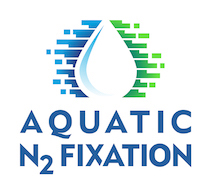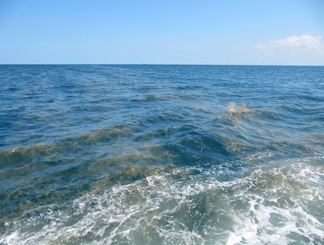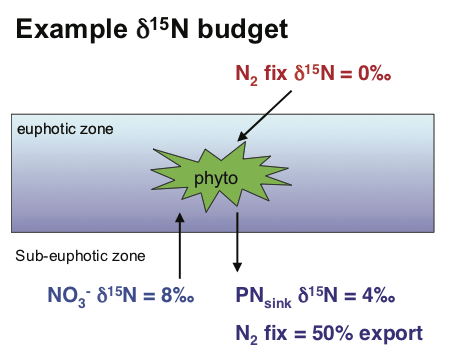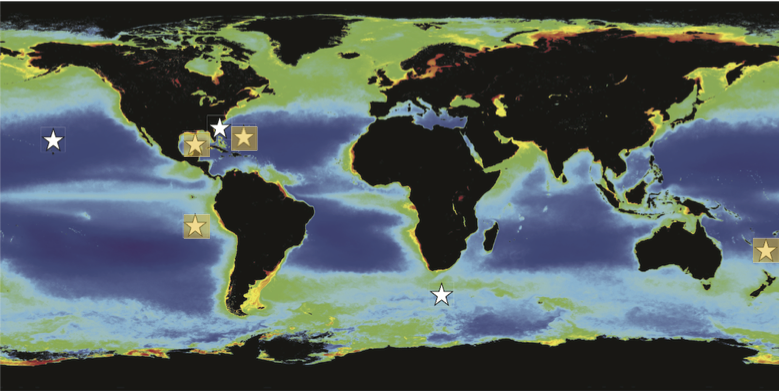RESEARCH: N2 fixation
N2 fixation is the primary pathway by which nitrogen is added to
the ocean and is mediated by microbes
with the ability to reduce N2 gas to ammonium.
 |
I am on the Leadership Team of the
Aquatic N2 fixation Research Coordination Network |
 | Picture by A. Knapp in the Gulf of Mexico, June 2015, of a surface
slick of Trichodesmium spp.
|
 |
Since N2 fixation is biologically mediated, the rates and spatial
distribution of this process are directly related to the
sensitivities of the organisms carrying out this process. Related
to our work on NO3-, we can compare the δ15N of the sinking flux with
the δ15N of newly fixed nitrogen to estimate how much N2 fixation is
occurring. |
Where?

Isotopic evidence indicates N2 fixation is occuring at
significant rates in the Western Tropical
South Pacific, but at much lower rates in the Eastern Tropical South
Pacific, and the Sargasso Sea. A current project is evalauting the
importance of N2 fixation and NO3- in the Gulf of Mexico, especially as they
may support the food web of larval bluefin tuna.
Publications
Knapp, A.N., K.M. McCabe, O. Grosso, N. Leblond, T. Moutin, and
S. Bonnet, Distribution and rates of nitrogen fixation in the
western tropical South Pacific Ocean constrained by nitrogen isotope
budgets, 2018, Biogeosciences, 15, 2619-2628,
doi:10.5194/bg-2619-2018
Marconi, D., D. Sigman, K. Casciotti, E. Campbell, M. Weigand,
S. Fawcett, A. Knapp, P. Rafter, B. Ward, and G. Haug, Tropical
dominance of N2 fixation in the North Atlantic Ocean, 2017,
Global Biogeochemical Cycles, 31, doi:10.1002/2016GB005613
Knapp, A.N., S.E. Fawcett, A. Martinez-Garcia, N. Leblond,
T. Moutin, and S. Bonnet, Nitrogen isotopic evidence for a shift
from nitrate- to diazotroph-fueled export production in the VAHINE
mesocosm experiments, 2016, Biogeosciences, 13, 4645-4657,
doi:10.5194/bg-13-4645-2016
Knapp, A.N., K.L. Casciotti, W.M. Berelson, M.G. Prokopenko, and
D.G. Capone, Low rates of nitrogen fixation in the eastern tropical
South Pacific surface waters, 2016, Proceedings of the National
Academy of Sciences, 113, 4398-4403, doi:10.1073/pnas.1515641113
Berelson, W.M., W. Haskell, M.G. Prokopenko, A.N. Knapp,
D. Hammond, N. Rollins, D.G. Capone, 2015, Biogenic rain and
benthic remineralization in the Eastern Tropical South Pacific,
Deep-Sea Research I, 99, 23-34, doi:10.1016/j.dsr.2014.12.006.
Knapp, A.N., 2012, The sensitivity of marine N2 fixation
to dissolved inorganic nitrogen, Frontiers in Microbiology, 3:374. doi: 10.3389/fmicb.2012.00374
Knapp, A.N., J. Dekaezemacker, S. Bonnet, J.A. Sohm,
and D.G. Capone, 2012, Sensitivity of Trichodesmium and
Crocosphaera abundance and N2 fixation rates to varying NO3-
and PO43- concentrations in batch cultures, Aquatic
Microbial Ecology, 66, 223-236, doi:10.3354/ame01577
Knapp, A.N., P.J. DiFiore, C. Deutsch, D.M. Sigman, and F. Lipschultz, 2008, Nitrate isotopic composition between Bermuda and Puerto Rico Implications for N2 fixation in the Atlantic Ocean, Global Biogeochem. Cycles, 22, GB3014.
Capone, D.G., and A.N. Knapp, 2007, A marine nitrogen cycle fix?,
Nature, 445, 159-160
Knapp, A.N., D.M. Sigman, and
F. Lipschultz, 2005, N isotopic composition of dissolved organic
nitrogen and nitrate at the Bermuda Atlantic Time-series Study site, Global Biogeochem. Cycles, 19, GB1018, doi:10.1029/2004GB002320
This personal Web page is not an official Florida State University
Web page.



